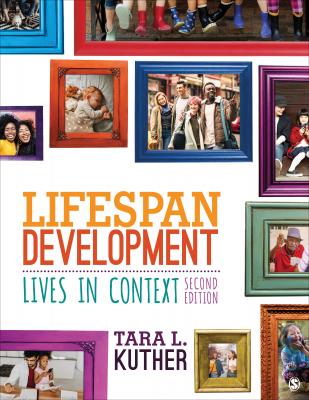ТОП просматриваемых книг сайта:
Lifespan Development. Tara L. Kuther
Читать онлайн.Название Lifespan Development
Год выпуска 0
isbn 9781544332253
Автор произведения Tara L. Kuther
Издательство Ingram
4 Part I Foundations of Lifespan Human DevelopmentChapter 1: Understanding Human Development: Approaches and TheoriesWhat Is Lifespan Human Development?Development Is MultidimensionalDevelopment Is MultidirectionalDevelopment Is PlasticDevelopment Is Influenced by Multiple ContextsDevelopmental Science Is MultidisciplinaryBasic Issues In Lifespan Human DevelopmentContinuities and Discontinuities in DevelopmentIndividuals Are Active in DevelopmentNature and Nurture Influence DevelopmentTheoretical Perspectives on Human DevelopmentPsychoanalytic TheoriesFreud’s Psychosexual TheoryErikson’s Psychosocial TheoryBehaviorist and Social Learning TheoriesClassical ConditioningOperant ConditioningSocial Learning TheoryCognitive TheoriesPiaget’s Cognitive-Developmental TheoryInformation Processing TheoryContextual TheoriesVygotsky’s Sociocultural TheoryBronfenbrenner’s Bioecological Systems TheoryEthology and Evolutionary Developmental TheoryResearch In Human DevelopmentThe Scientific MethodMethods of Data CollectionObservational MeasuresSelf-Report MeasuresPhysiological MeasuresResearch DesignsCase StudyCorrelational ResearchExperimental ResearchDevelopmental Research DesignsCross-Sectional Research DesignLongitudinal Research DesignSequential Research DesignsResearch EthicsChapter 2: Biological and Environmental FoundationsGenetic Foundations of DevelopmentGeneticsCell ReproductionSex DeterminationGenes Shared by TwinsPatterns of Genetic InheritanceDominant–Recessive InheritanceIncomplete DominancePolygenic InheritanceGenomic ImprintingChromosomal and Genetic ProblemsGenetic DisordersDominant–Recessive DisordersX-Linked DisordersChromosomal AbnormalitiesMutationReproductive ChoicesGenetic CounselingReproductive TechnologyAdoptionPrenatal DiagnosisPrenatal Treatment of Genetic DisordersHeredity And EnvironmentBehavioral GeneticsMethods of Behavioral GeneticsGenetic Influences on Personal CharacteristicsGene–Environment InteractionsRange of ReactionCanalizationGene–Environment CorrelationsEpigenetic Influences on DevelopmentChapter 3: The Prenatal Period, Birth, and the NewbornPrenatal DevelopmentConceptionGerminal Period (0 to 2 Weeks)Embryonic Period (3 to 8 Weeks)Fetal Period (9 Weeks to Birth)Second Trimester (14 to 26 Weeks)Third Trimester (27 to 40 Weeks; Seventh, Eighth, Ninth Months)Contextual and Cultural Influences on Prenatal CareEnvironmental Influences on Prenatal DevelopmentPrinciples of TeratologyTypes of TeratogensPrescription and Nonprescription DrugsAlcoholCigarette SmokingMarijuanaCocaine and HeroinMaternal IllnessEnvironmental HazardsParental Characteristics and BehaviorsChildbirthLaborMedication During DeliveryCesarean DeliveryNatural ChildbirthHome BirthThe NewbornMedical and Behavioral Assessment of NewbornsThe Newborn’s Perceptual CapacitiesNewborn States of ArousalLow-Birthweight Infants: Preterm and Small-for-Date Babies
5 Part II Infancy and ToddlerhoodChapter 4: Physical Development in Infancy and ToddlerhoodBody Growth and Nutrition in Infants and ToddlersGrowth NormsBreastfeedingSolid FoodMalnutritionFailure to ThriveBrain Development During Infancy and ToddlerhoodProcesses of Neural DevelopmentThe Cerebral CortexExperience and Brain DevelopmentSleep and Brain DevelopmentEarly Learning CapacitiesHabituationClassical ConditioningOperant ConditioningImitationSensation and Perception During Infancy and ToddlerhoodVisionHearingTouchSmell and TasteIntermodal PerceptionMotor Development During Infancy and ToddlerhoodGross Motor DevelopmentFine Motor DevelopmentBiological and Contextual Determinants of Motor DevelopmentBiological Influences on Motor DevelopmentContextual Influences on Motor DevelopmentMotor Development as a Dynamic SystemChapter 5: Cognitive Development in Infancy and ToddlerhoodPiaget’s Cognitive-Developmental TheoryProcesses of DevelopmentSensorimotor SubstagesSubstage 1: Reflexes (Birth to 1 Month)Substage 2: Primary Circular Reactions (1 to 4 Months)Substage 3: Secondary Circular Reactions (4 to 8 Months)Substage 4: Coordination of Secondary Circular Reactions (8 to 12 Months)Stage 5: Tertiary Circular Reactions (12 to 18 Months)Substage 6: Mental Representation (18 to 24 Months)Evaluating Sensorimotor ReasoningViolation-of-Expectation TasksA-Not-B TasksDeferred Imitation TasksCore Knowledge Theory: An Alternative PerspectiveInformation Processing TheoryOrganization of the Information Processing SystemAttentionMemoryInfants’ ThinkingIndividual Differences in Infant IntelligenceTesting Approach to IntelligenceIntelligence as Information ProcessingLanguage Development in Infancy and ToddlerhoodEarly Preferences for Speech SoundsPrelinguistic CommunicationFirst WordsLearning Words: Semantic GrowthTwo-Word UtterancesTheories of Language DevelopmentLearning Theory and Language DevelopmentNativist Theory and Language DevelopmentInteractionist Perspective on Language DevelopmentChapter 6: Socioemotional Development in Infancy and ToddlerhoodPsychosocial Development in Infancy and ToddlerhoodTrust Versus MistrustAutonomy Versus Shame and DoubtEmotional Development in Infancy and ToddlerhoodInfants’ Emotional ExperienceBasic EmotionsSelf-Conscious EmotionsEmotion RegulationSocial Interaction and Emotional DevelopmentParental InteractionSocial ReferencingCultural Influences on Emotional DevelopmentEmotional Display RulesStranger WarinessTemperament in Infancy and ToddlerhoodStyles of TemperamentContext and Goodness of FitCultural Differences in TemperamentAttachment in Infancy and ToddlerhoodBowlby’s Ethological Perspective on AttachmentInfants’ Signals and Adults’ ResponsesPhases of AttachmentSecure Base, Separation Anxiety, and Internal Working ModelsAinsworth’s Strange Situation and Attachment ClassificationsAttachment-Related OutcomesInfluences on AttachmentStability of AttachmentCultural Variations in Attachment ClassificationsThe Self in Infancy and ToddlerhoodSelf-AwarenessSelf-RecognitionEmerging Self-ConceptSelf-Control
6 Part III Early ChildhoodChapter 7: Physical and Cognitive Development in Early ChildhoodPhysical Development in Early ChildhoodGrowthNutritionBrain DevelopmentMotor DevelopmentGross Motor SkillsFine Motor SkillsCognitive-Developmental and Sociocultural Reasoning in Early ChildhoodPiaget’s Cognitive-Developmental Theory: Preoperational ReasoningCharacteristics of Preoperational ReasoningEvaluating Preoperational ReasoningVygotsky’s Sociocultural TheoryGuided Participation and ScaffoldingZone of Proximal DevelopmentEvaluating Vygotsky’s Sociocultural TheoryInformation Processing In Early ChildhoodAttentionWorking Memory and Executive FunctionMemoryMemory for InformationMemory for ScriptsAutobiographical MemoryTheory of MindFalse BeliefContextMetacognitionLanguage Development In Early ChildhoodVocabularyEarly GrammarPrivate SpeechMoral Development in Early ChildhoodSocial Learning TheoryCognitive-Developmental TheoryHeteronomous MoralityPreconventional ReasoningConceptions of Moral, Social, and Personal IssuesEarly Childhood EducationChild-Centered and Academically Centered Preschool ProgramsEarly Childhood Education InterventionsChapter 8: Socioemotional Development in Early ChildhoodEmerging Sense of SelfPsychosocial Development in Early ChildhoodSelf-ConceptSelf-EsteemEmotional Development in Early ChlidhoodEmotional UnderstandingEmotion RegulationEmpathy and Prosocial BehaviorProsocial BehaviorInfluences on Prosocial BehaviorAggressionParentingParenting StylesAuthoritarian ParentingPermissive ParentingUninvolved ParentingAuthoritative ParentingCulture, Context, and ParentingChild MaltreatmentEffects of Child MaltreatmentRisk Factors for Child MaltreatmentGender Stereotypes, Gender Differences, and Gender DevelopmentGender Role Norms and Gender StereotypesSex DifferencesTheoretical Perspectives on Gender Role DevelopmentBiological ExplanationsCognitive ExplanationsContextual ExplanationsPlay and Peer Relationships in Early ChildhoodTypes of PlayPlay and Children’s DevelopmentPeer RelationshipsImaginary Companions
7 Part IV Middle ChildhoodChapter 9: Physical and Cognitive Development in Middle ChildhoodPhysical and Motor Development in Middle ChildhoodBody GrowthMotor DevelopmentCommon Health Issues in Middle ChildhoodChildhood InjuriesChildhood ObesityCognitive Development in Middle ChldhoodPiaget’s Cognitive-Developmental Theory: Concrete Operational ReasoningClassificationConservationCulture and Concrete Operational ReasoningInformation ProcessingWorking Memory and Executive FunctionMetacognition and MetamemoryMemory StrategiesContext and CognitionIntelligenceIntelligence TestsIndividual and Group Differences in IQContextual Influences on IQAlternative Views of IntelligenceMultiple IntelligencesTriarchic Theory of IntelligenceMoral Development in Middle ChildhoodMoral Reasoning: Piaget’s TheoryChildren’s Conceptions of Justice: Kohlberg’s Cognitive-Developmental PerspectiveDistributive Justice ReasoningDistinguishing Moral and Conventional

